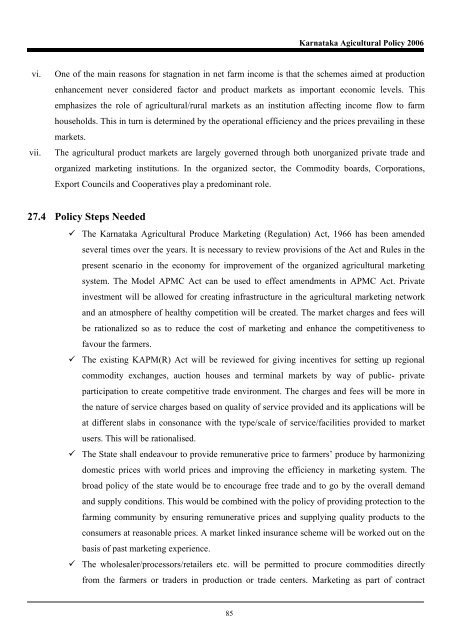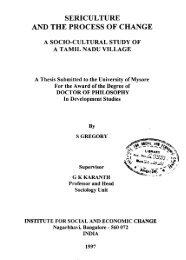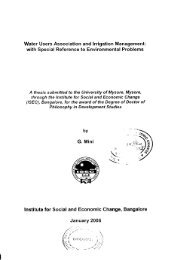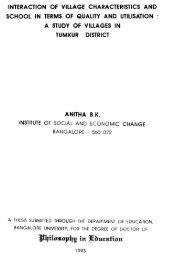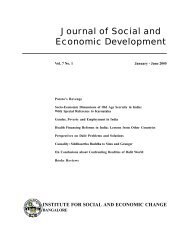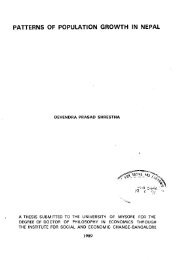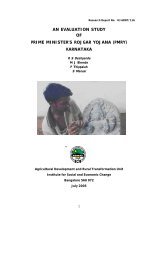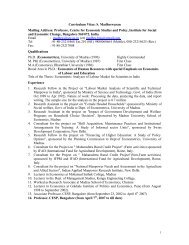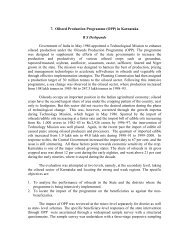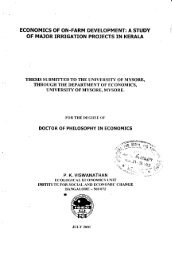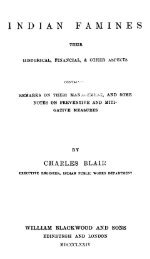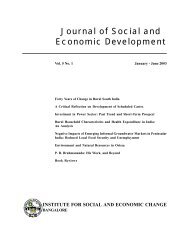Karnataka Agricultural Policy - Institute for Social and Economic ...
Karnataka Agricultural Policy - Institute for Social and Economic ...
Karnataka Agricultural Policy - Institute for Social and Economic ...
Create successful ePaper yourself
Turn your PDF publications into a flip-book with our unique Google optimized e-Paper software.
<strong>Karnataka</strong> Agicultural <strong>Policy</strong> 2006<br />
vi.<br />
vii.<br />
One of the main reasons <strong>for</strong> stagnation in net farm income is that the schemes aimed at production<br />
enhancement never considered factor <strong>and</strong> product markets as important economic levels. This<br />
emphasizes the role of agricultural/rural markets as an institution affecting income flow to farm<br />
households. This in turn is determined by the operational efficiency <strong>and</strong> the prices prevailing in these<br />
markets.<br />
The agricultural product markets are largely governed through both unorganized private trade <strong>and</strong><br />
organized marketing institutions. In the organized sector, the Commodity boards, Corporations,<br />
Export Councils <strong>and</strong> Cooperatives play a predominant role.<br />
27.4 <strong>Policy</strong> Steps Needed<br />
The <strong>Karnataka</strong> <strong>Agricultural</strong> Produce Marketing (Regulation) Act, 1966 has been amended<br />
several times over the years. It is necessary to review provisions of the Act <strong>and</strong> Rules in the<br />
present scenario in the economy <strong>for</strong> improvement of the organized agricultural marketing<br />
system. The Model APMC Act can be used to effect amendments in APMC Act. Private<br />
investment will be allowed <strong>for</strong> creating infrastructure in the agricultural marketing network<br />
<strong>and</strong> an atmosphere of healthy competition will be created. The market charges <strong>and</strong> fees will<br />
be rationalized so as to reduce the cost of marketing <strong>and</strong> enhance the competitiveness to<br />
favour the farmers.<br />
The existing KAPM(R) Act will be reviewed <strong>for</strong> giving incentives <strong>for</strong> setting up regional<br />
commodity exchanges, auction houses <strong>and</strong> terminal markets by way of public- private<br />
participation to create competitive trade environment. The charges <strong>and</strong> fees will be more in<br />
the nature of service charges based on quality of service provided <strong>and</strong> its applications will be<br />
at different slabs in consonance with the type/scale of service/facilities provided to market<br />
users. This will be rationalised.<br />
The State shall endeavour to provide remunerative price to farmers’ produce by harmonizing<br />
domestic prices with world prices <strong>and</strong> improving the efficiency in marketing system. The<br />
broad policy of the state would be to encourage free trade <strong>and</strong> to go by the overall dem<strong>and</strong><br />
<strong>and</strong> supply conditions. This would be combined with the policy of providing protection to the<br />
farming community by ensuring remunerative prices <strong>and</strong> supplying quality products to the<br />
consumers at reasonable prices. A market linked insurance scheme will be worked out on the<br />
basis of past marketing experience.<br />
The wholesaler/processors/retailers etc. will be permitted to procure commodities directly<br />
from the farmers or traders in production or trade centers. Marketing as part of contract<br />
85


